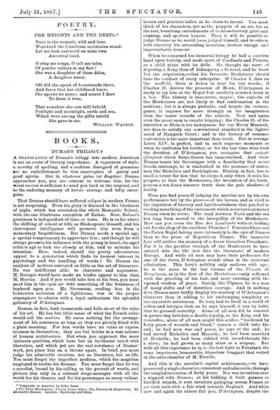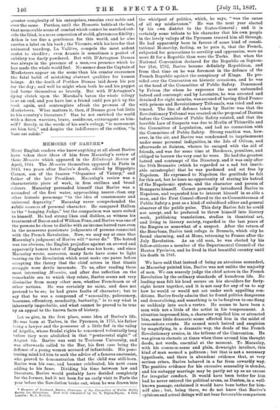BOOKS.
DUMAS'S TRILOGY.f
A TRANSLATION of Dumas's trilogy into modern American is not an event of literary importance. A vagueness of style, a novelty of spelling, and a reckless disregard of grammar are no embellishment to this masterpiece of gaiety and good spirits. But in whatever guise (or disguise) Dumas approaches you, you are content to welcome him, for the worst excuse is sufficient to send you back to the original, and to the enduring memory of heroic courage and lofty enter- prise.
That Dumas should have suffered eclipse in modern France is not surprising. Even his glory is dimmed in the blackness of night, which has overtaken the whole Romantic School, with the one illustrious exception of Balzac. Now, Balzac's greatness is independent of time or taste. He is as far above the shifting of school or title as Shakespeare himself, and his clairvoyant intelligence will preserve him even from a momentary forgetfulness. But Dumas needs a special age, a special temperament, to appreciate him ; and though he will always preserve his influence with the young in heart, the aged critic is apt to look too closely at him, and to mistake his intention. How, indeed, should the purely adventurous appeal to a generation which finds its keenest interest in psychology and the handling of words ? To Dumas the analysis of motives conveyed as little as the art of literature. He was indifferent alike to character and expression. M. Bourget would have made no louder appeal to him than M. Moreas. And if you would take him at his best, you must meet him in the open air with something of the freshness of boyhood upon you. Mr. Stevenson, reading him in the boisterous seclusion of a lighthouse, was in the proper atmosphere to admire with a loyal enthusiasm the splendid gallantry of D'Artagnan.
Dumas, in fact, both transcends and falls short of the rules of his art. He has but little sense of what the French critic would call his mature. He cares nothing for the arrange- ment of his sentences, so long as they are plainly fitted with a plain meaning. For him words have no value or expres- siveness in themselves ; they are but bricks in a vast scheme of human architecture. But when you approach the more intimate qualities, which have but an incidental touch with literature, and which yet are the real substance of Dumas' work, you place him on a throne apart. In brief, you must judge his admirable creation, not as literature, but as life. You must forget the imperfect medium, which the magician employed to realise his dreams. You must forget that he was a novelist, bound by his calling to the pursuit of words, and picture him only as a colossal stage-manager with all the world for his theatre, and for his personages as many valiant
• Copyright in America by John Lane.
t The Three Musketeers ; Twenty Years After; The Vicomte do Bragetonns. By Alexandre Dumas. London: Routledge and Sons.
heroes and gracious ladies as he ()hose to invent. You must think of his characters, not as the puppets of an art, but as the real, breathing embodiments of reckless bravery, profound cunning, and spotless honour. Then it will be possible to judge Dumas as he would have judged himself, and to esteem with sincerity his astounding invention, tireless energy, and imperturbable humour.
When he composed his immortal trilogy he laid a careless hand upon history, and made sport of Cardinals and Princes, as a child plays with its dolls. He thought no more of deposing a King than of kidnapping a General, and he knew but one stipulation,—that his favourite Musketeers should have the conduct of every enterprise. If Charles I. dies on the scaffold, there is Athos to bear his last words ; if Charles II. desires the presence of Monk, D'Artagnan is ready to lay him at the Royal feet carefully screwed down in a box. The history is inaccurate, maybe ; the exploits of the Musketeers are not likely to find confirmation in the archives ; but it is always probable, and despite its extrava- gance, it imposes far more strongly on the imagination than the tamer records of the schools. Now and again even the great man is caught tripping ; the Charles II. of the interview at Blois is too lachrymose for our Merry Monarch, nor does he satisfy our conventional standard in the lighter mood of Hampton Court ; and in the history of romance convention is far more important than truth. But in revenge Louis XIV. is perfect, and in such supreme moments as when he confronts his brother, or for the last time wins back the devotion of D'Artagnan, you recognise that majeete effrayante which Saint-Simon has immortalised. And while Dumas treats his Sovereigns with a familiarity that never breeds contempt, he is unabashed in the presence of states- men like Richelieu and Buckingham. History, in fact, has so small a terror for him that he obeys it only when it snits his purpose, so that the Musketeers, the invention of his brain, possess a ten times sincerer truth than the pale shadows of reality.
Thus you find yourself judging the novelist not by his own performance but by the prowess of his heroes, and so vivid is the impulsion of bravery and lightheartedness that you feel in reading something of the excitement which must have animated Dumas when he wrote. The road between Paris and the Bea has long been sacred to the intrepidity of the Musketeers. How can you cross the Rue des Lombards without looking out for the shop of the excellent Planchet ? Fontainebleau and the Palais Royal belong more intimately to the epic of Dumas than to the prose of Republican France. The immortal four will outlive the memory of a dozen blameless Presidents. For it is the peculiar triumph of the Musketeers to have entered into the life (not into the literature) of modern Europe. And while all men may have their preference for one of the three, D'Artagnan stands alone in the universal admiration. This hero's nobility only mellows with age ; he is the same in the last volume of the Vicomte de Bragelonne, as in the first of the Musketeers,—only softened with the grizzling of his hair, and more cunning with the ripened wisdom of years. Surely, like Ulysses, he is a man of many shifts and of dauntless courage. And in nothing does Dramas more boldly display his mastery of D'Artagnan's character than in adding to his unchanging simplicity an incomparable astuteness. So long had he lived in a world of action and intrigue that, as be says himself, it was by habit that he guessed correctly. Alone of all men did he succeed in preserving inviolate a double loyalty, to his King and his comrades ; alone of all men might this soldier, "hardened by forty years of wounds and blood," remain a child unto the end; he had seen war and peace, he says at the end ; he had served Richelieu and Mazarin ; he had been scorched at Rochelle ; he had been riddled with sword-thrusts like a sieve; he had grown as many skins as a serpent. But with all this experience he is, to the last fight in Friesland, the same impetuous, honourable, blameless braggart that waited in the ante-chamber of M. Treville.
And this is the novelist's capital achievement, —to have preserved a single character, consistent and admirable, through the tangled invention of forty years. Nor was invention ever a niggard with Dumas ; at his bidding it built palaces or fortified islands, it sent cavaliers galloping across France or set their sails with a fair wind towards England. And while now and again the others fail you, D'Artagnan, despite the
greater complexity of his enterprises, remains ever noble and ever the same. Porthos, until the Homeric battle at the last, that memorable scene of combat which cannot be matched out- side the Iliad, is a mere concretion of stolid, gluttonous fidelity ; Athos is too fine a gentleman for this world, and he also carries a label on his back ; the Vicomte, with his love for that animated teardrop, La Valliere, compels the most ardent zealot to shudder ; even Aramis is sometimes a packet of subtlety too finely powdered. But with D'Artagnan Dumas was always in the presence of a man,—a presence which he has made the whole world feel. No sooner does the Captain of Muslceteers appear on the scene than his creator overcomes the fatal habit of mistaking abstract qualities for human beings. At the death of Porthos Dumas laid down his pen for the day ; and well he might when both he and his puppet had borne themselves so bravely. But with D'Artagnan's dying clutch upon the Marshal's baton the whole trilogy is at an end, and you have lost a friend until you pick up the book again, and contemplate afresh the prowess of the Musketeers. What matters it, then, if Dumas gave but little to his country's literature ? Has he not enriched the world with a dozen warriors, brave, assiduous, extravagant as him- self ? Surely, in the words of his son's eulogy, "le monument eat bien biiti," and despite the indifference of the critics, "la base eat Bolide."







































 Previous page
Previous page